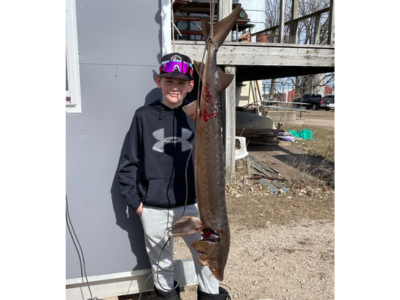February 19, 2024 – Fond du Lac Co., WI – After a relatively cold weekend, we had our slowest day of the season. Only 10 lake sturgeon were harvested from Lake Winnebago (2 juvenile females, 3 adult females and 5 males), bringing the Lake Winnebago season total to 39 juvenile females, 91 adult females and 129 males. The biggest fish of the day again came from the Southwest registration station – a 69.3-pound, 79.6-inch, M1 male speared by Steven Hungerford on Lake Winnebago.

While the upriver harvest continues to be slow, we still see fish coming in. Today, 4 lake sturgeon were harvested on the Upriver Lakes (1 juvenile female, 1 adult female and 2 males).
Click HERE to SUBSCRIBE to FREE local news at
Washington County Insider on YouTube
Despite uncooperative weather conditions this season, an impressive 367 lake sturgeon have been harvested throughout the system.
View the full details in today’s harvest report.
Even on this slow day, Gage Schrader and Ayden Nummerdor both found success. Gage speared a 19.7-pound, 47.1-inch, FV female from Lake Poygan. Ayden speared a 15.3-pound, 44.9-inch, MV male from Lake Winnebago. These fish were likely not much older than Gage and Ayden, with DNR biologists estimating the fish at approximately 16 years old. The “V” in the FV and MV classifications refers to the male and female fish not yet reaching maturity. Congrats, Gage and Ayden!
Tuesday, Feb. 20, the Poygan registration station on the Upriver Lakes will be closed, but the Indian Point and Winneconne registrations will remain open. The Neenah, Stockbridge and Quinney registration stations will remain closed on Lake Winnebago.
We will continue to include registration station updates in our daily emails, or you can check the DNR Winnebago System Sturgeon Spearing webpage for updates.

|
|
Reintroduction Programs Part 2: Georgia
Over 800 miles from Oshkosh, the sun rises over the Ridge and Valley Appalachian Mountain range and hits the Coosa River on another warm, sunny day in Georgia. With an average temperature of 56⁰F in February, northwest Georgia can seem a world away from a cold spearing day on Lake Winnebago. Yet, this is the new home for over 330,000 Winnebago lake sturgeon since 2002.
The Coosa River extends from Georgia into northeastern Alabama with a confluence of three different rivers in Georgia (Coosawattee, Etowah and Oostanaula rivers). Lake sturgeon have been extirpated in this region since the 1970s due to a series of major dams and reservoirs erected in the 1900s, as well as deteriorating water quality from excessive nutrient loading from local agriculture.
In 2002, efforts began to bring lake sturgeon back to the Coosa River basin. Now, 20 years later, the Georgia DNR is starting to observe large individual sturgeon within the river system. In 2022, a 52-inch, 24-pound lake sturgeon was captured during sampling. This is the largest lake sturgeon seen in the Coosa River since the species’ extirpation. While it is no Lake Winnebago giant, it is still a promising sign for things to come for this new population. Because the reintroduction program is only 20 years old, those in Georgia are only starting to see individuals come into maturity and begin to spawn. Between 2022 and 2023, the Georgia DNR captured 97 individuals measuring between 11 and 52 inches.
The DNR, along with our partners in Georgia, are excited to start seeing lake sturgeon come back to the area, and we look forward to seeing this population continue to expand.

Lake Sturgeon caught during annual sampling on the Etowah River, a tributary of the Coosa River in Georgia, in 2023. / Photo Credit: Georgia Department of Natural Resources
|
|
No Ice Is 100% Safe
Here are a few basic ice safety tips to remember:
- Carry a cell phone, and let people know where you are going and when you’ll return home.
- Wear proper clothing and equipment, including a life jacket or a float coat, to help you stay afloat and to help maintain body heat.
- Wear ice creepers attached to boots to prevent slipping on clear ice.
- Carry a spud bar to check the ice while walking to new areas.
- Carry a few spikes and a length of light rope in an easily accessible pocket to help pull yourself – or others – out of the ice.
- If you fall in, remain as calm as possible. While attempting to get out of the water, call for help. Anyone who attempts to rescue you should use a rope or something similar to avoid falling through themselves.
- Do not travel in unfamiliar areas or at night.
Have a plan in place noting where you will be and when you plan to return. Along with leaving a written note of your plans, keeping a charged cell phone is also recommended.
Check out the DNR’s Ice Safety webpage for more information on staying safe on the ice, including tips for creating ice claws and what to do if you fall through ice.
CLICK HERE to read earlier reports.









